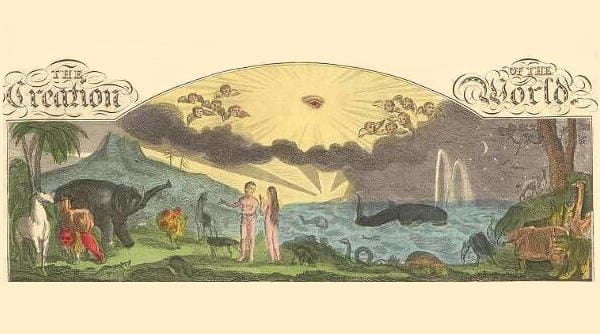Rediscovering “Work” with Purpose
Labor Day marks the end of the summer season for Americans as it represents a return to work and school for many. In particular, it is meant to serve as a tribute for the contributions and achievements of  American workers. While the day is marked mostly by families having parties and barbecues in the more accommodating September weather, it should be a moment for serious pause because, ultimately, our lives (and civilization) are marked by the work we do. That raises a critical question: Why do we do the work that we do? Put another way, what is the purpose of our work? In today’s post-industrial age, the majority say it is to collect a paycheck in order to put food on the table and pay the bills. The rhythm of the work revolves around making it until Wednesday evening when the hump of the work week has passed and then looking forward to the weekend. Beyond that, it is counting the days until one can share ten to fourteen days on vacation living the life you ultimately desire with family and loved ones. This description fits most of the “work” of the industrial age from the 19th century to the present day. Very few actually like the work they do and feel trapped in a world of “jobs” that do not satisfy and that ultimately have disrupted the family unit where more and more couples feel forced to work two jobs to cover the costs of living these days.
American workers. While the day is marked mostly by families having parties and barbecues in the more accommodating September weather, it should be a moment for serious pause because, ultimately, our lives (and civilization) are marked by the work we do. That raises a critical question: Why do we do the work that we do? Put another way, what is the purpose of our work? In today’s post-industrial age, the majority say it is to collect a paycheck in order to put food on the table and pay the bills. The rhythm of the work revolves around making it until Wednesday evening when the hump of the work week has passed and then looking forward to the weekend. Beyond that, it is counting the days until one can share ten to fourteen days on vacation living the life you ultimately desire with family and loved ones. This description fits most of the “work” of the industrial age from the 19th century to the present day. Very few actually like the work they do and feel trapped in a world of “jobs” that do not satisfy and that ultimately have disrupted the family unit where more and more couples feel forced to work two jobs to cover the costs of living these days.
Is this what God intended for “work”? Are we supposed to live to work or work to live? The way most of the world is organized today, it would seem that we live in order to work. But this is NOT what God intended “in the beginning”. God revealed the true meaning of work when He made the heavens and earth.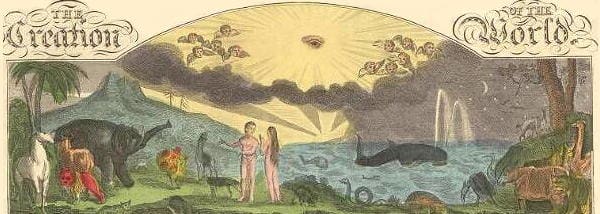
- First, we learn from Genesis that God’s work is creative and gives life. That creative work culminated on the 6th day when God made man, male and female, after His own image and likeness. Therefore, the work of man will be authentic to the extent that it images God’s work that is an outflow of His creative love. This is why the industrial age was such an affront against man — no matter what it claims as its scientific accomplishments — as it made man a mere cog in the machine with no dignity for his creative skills. Value was in production. And this later became reflected in education in both the east and now in the west where the point of education is not freedom of the individual, but to put each child on a conveyor belt for a specific job in life.
- Second, we see in Genesis that all of God’s work was ordered to Him, especially man’s dominion over the earth. God’s order is based on a creative and loving work that leads to man’s greatest freedom. This is why obedience to God’s law, which is written in every heart (because we are made in God’s image and likeness), is essential to all work and the measure of any true progress. Satan
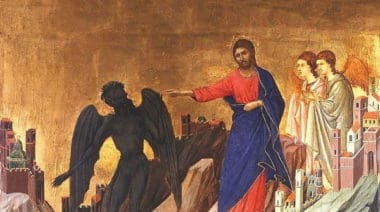 always offers a counterfeit to humanity, which is simply an inversion of God’s order, where the emphasis is redirected from the glory of God to the self-glorification of man. The 19th and 20th centuries have witnessed the greatest push by man to progress without God as if His glory can be, literally, manufactured (made by human hands). What fruits has the industrial revolution born humanity? The splitting up of families, the separation of the children from their parents, etc. The rapid advancement in technology without a moral and spiritual compass has been used predominantly to enslave humanity and put it on the brink of self-annihilation. It’s a simple equation: self-glorification leads to slavery and self-annihilation. Work for the glorification of God leads to true self-discovery, innovation and salvation.
always offers a counterfeit to humanity, which is simply an inversion of God’s order, where the emphasis is redirected from the glory of God to the self-glorification of man. The 19th and 20th centuries have witnessed the greatest push by man to progress without God as if His glory can be, literally, manufactured (made by human hands). What fruits has the industrial revolution born humanity? The splitting up of families, the separation of the children from their parents, etc. The rapid advancement in technology without a moral and spiritual compass has been used predominantly to enslave humanity and put it on the brink of self-annihilation. It’s a simple equation: self-glorification leads to slavery and self-annihilation. Work for the glorification of God leads to true self-discovery, innovation and salvation.
- A third revelation about work that we see in Genesis is that it serves an ultimate purpose — to rest with God in heaven. This is such an important point because it is all but lost in the world today, where the end of “work” is money or worldly power. The point of God resting on the 7th day was not because He was exhausted from creating zillions of life forms and ordering them all to Himself, through humanity. God rested on the 7th day in order to bless it and hallow it. In doing this, God revealed that while man was created on the sixth day, he was made for the 7th day, eternal rest with God in heaven. In other words, man was created to be consecrated (set apart for the holy) to God. In that same light is man’s work to be ordered as well.
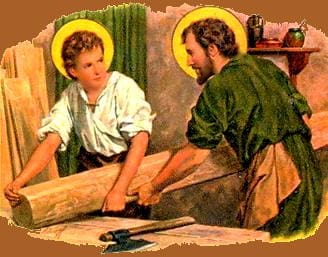 In the first two chapters of Genesis, we see in a nutshell the paradigm for all work. Our work is meant to be creative, innovative and ordered to heaven. When humanity views work this way, we have an entirely different civilization. Actually, we can only have a true civilization when we work in this way. That is why the working of land, craftsmanship/ carpentry, caring for others through natural remedies and teaching, have always been those forms of work most consonant with God’s revelation of work from the time of creation, and are also directly related to man being free.
In the first two chapters of Genesis, we see in a nutshell the paradigm for all work. Our work is meant to be creative, innovative and ordered to heaven. When humanity views work this way, we have an entirely different civilization. Actually, we can only have a true civilization when we work in this way. That is why the working of land, craftsmanship/ carpentry, caring for others through natural remedies and teaching, have always been those forms of work most consonant with God’s revelation of work from the time of creation, and are also directly related to man being free.
A sign of great hope is that we are seeing a rediscovery and return to these ways of life that have the building up of the family and a return to the land where God meets man in a special way. Monks of every age intentionally live this way for this purpose. As the industrial ages dies out, we will continue to see a 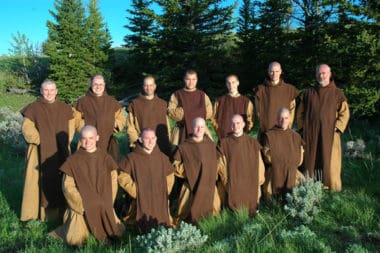 resurgence in many to take control of their lives in order to pursue without fear God’s purpose for them. It’s a return to the human and Catholic genius that has restored humanity in every critical cycle of history. And this renaissance is built upon man rediscovering why God created him and why God created him in this moment in history. Each person has a unique and special purpose for which he is created; if he doesn’t accomplish it, no one will.
resurgence in many to take control of their lives in order to pursue without fear God’s purpose for them. It’s a return to the human and Catholic genius that has restored humanity in every critical cycle of history. And this renaissance is built upon man rediscovering why God created him and why God created him in this moment in history. Each person has a unique and special purpose for which he is created; if he doesn’t accomplish it, no one will.
Purpose can only come from faith and the greater one’s purpose the greater one’s faith. It is equally true in the converse: the greater one’s faith, the greater should that person’s purpose be in life. This is the standard by which every saint lived. And the standard for every saint is nothing less than heroic. Therefore, since we Christians were baptized for one purpose and one purpose only — to be the greatest saint that God created us to be — a saint that is unique and unrepeatable from all others — we should be spending every moment of our lives trying to figure out what 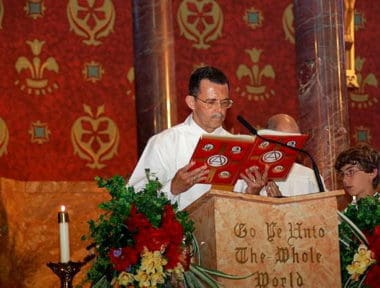 that is, so that we can live it NOW. We can only “figure it out” (also known as discernment) by speaking with God, sharing with Him our hearts and our passions and asking Him why He has them there and for what purpose. This is what prayer is — a heart to heart conversation with God in which we incline our ear to His and find Him inclining His ear toward us — and why it is so important. This is how the saints discovered God’s will to them. They looked for God and listened to Him in His Word. Attentiveness to His Word at Mass was enhanced by a daily conversation these saints had with God, so that when the day came for them to discover God’s special purpose for them, they were primed and ready. Look at St. Antony of the Desert, St. Augustine, St. Francis of Assisi — all of whom God called through their hearing of His word, whether it was during the day’s Liturgy or walking about a garden.
that is, so that we can live it NOW. We can only “figure it out” (also known as discernment) by speaking with God, sharing with Him our hearts and our passions and asking Him why He has them there and for what purpose. This is what prayer is — a heart to heart conversation with God in which we incline our ear to His and find Him inclining His ear toward us — and why it is so important. This is how the saints discovered God’s will to them. They looked for God and listened to Him in His Word. Attentiveness to His Word at Mass was enhanced by a daily conversation these saints had with God, so that when the day came for them to discover God’s special purpose for them, they were primed and ready. Look at St. Antony of the Desert, St. Augustine, St. Francis of Assisi — all of whom God called through their hearing of His word, whether it was during the day’s Liturgy or walking about a garden.
The work that flowed from their daily conversation and communion with God is now indelibly written into the greatest chapters of the history of the world. There was never a dull moment in their lives once they understood the purpose of their life and their vocation to “work” in these terms. They never bound themselves to the expectations and mere conventions of men. They truly believed what St. Paul did and said, “I can do all things in Him who strengthens me.” Moreover, all their work had a definitive purpose — starting their path to heaven on earth, getting there at the end of their life and bringing as many people with them as possible. All material things in this world were means to that end. They understood and communicated to others that in order to live the most human of lives, we need the Life of the Divine within us, a Divine Life given to us only in Jesus Christ.
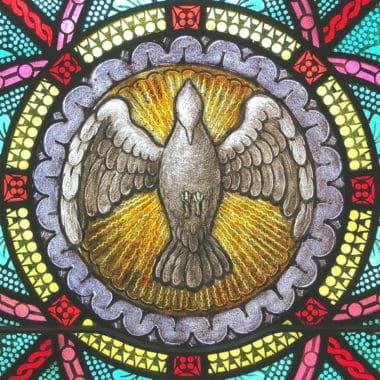 The leaders who will arise to lead this spiritually, morally and economically collapsing world will all share the same spirit, the Holy Spirit — they will be risk takers who are willing to stretch themselves to their natural limits in order to create, innovate and liberate others to live lives they believe God has called them to live and not what others believe they should live.
The leaders who will arise to lead this spiritually, morally and economically collapsing world will all share the same spirit, the Holy Spirit — they will be risk takers who are willing to stretch themselves to their natural limits in order to create, innovate and liberate others to live lives they believe God has called them to live and not what others believe they should live.
Do you truly know God’s purpose for you? What great and heroic work will you see to do for His Kingdom? Remember the words of Our Lord, “Much will be required of the person entrusted with much” (Luke 12:48).
Life is too short. Aim high and dare to dream big for God. Then trust unconditionally in Him and step out into the deep. That’s the “job” description of every Christian. The world is waiting.
Helping families discover God’s purpose for them is at the heart of the mission of Heroic Families. If you would like to bring this message to your parish or event, contact Dr. Howard by visiting HeroicFamilies.com
![Heroic Families Official Logo BANNER[1] (White)](https://spiritualdirection.com/wp-content/uploads/2015/09/HF-Official-Logo-BANNER1.jpg)
+
Art: Barbecue, Hedwig Storch, 13 July 2008 own work, CCA-SA 3.0 Unported; Detail from Creation of the World, William Belch, 1820, PD-US author’s life plus 100 years or less; Temptation on the Mount, Duccio di Buoninsegna, between 1308 and 1311, PD-US author’s life plus 100 years or less; Carpenter and Son, Thuydatnganchau, 5 November 2012 own work, CCA-SA; The Monks of the Most Blessed Virgin Mary of Mount Carmel standing on their new property known as the New Mount Carmel, Brmichaelmary333, 22 June 2010 own work, PD-Worldwide; All Saints Catholic Church (St. Peters, Missouri) – stained glass, sacristy; Deacon at a Mass, McN1316, 21 June 2009, Free Art License Copyleft; Holy Spirit detail, Nheyob, 8 July 2014, own work, CCA-SA 4.0 International; all Wikimedia Commons. Heroic Families Logo, courtesy of Dr. Peter Howard, used with permission.



